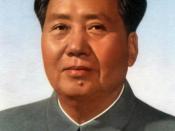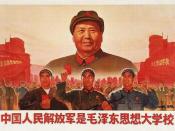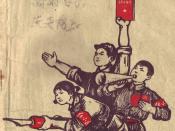The Great Leap forward failed, therefore Mao was demoted and the moderates took control because Mao was still too popular to resign. One of the political consequences was that Mao wanted to reassert himself and regain power in China after he was demoted because of the failure of the Great Leap Forward.
Mao had the gained the support of Lin Biao and the PLA therefore launched the Cultural Revolution. Mao wanted to get rid of anti communist ideas and opposition that would pose a threat to his leadership and foreign ideas that would influence the people of China. As a long-term consequence of getting rid of anti communist ideas, Mao closed down all schools and colleges for six months therefore propaganda could influence school children. The long-term consequence was that 120 million people under the age of 45 couldn't read or write by 1981 because forms of education had shut and since they had nothing to do, many heard Mao encouraging them to join the Red Guards.
A short-term consequence was that teachers were brutally tortured, beaten, humiliated, driven to suicide and imprisoned because they taught them how to think and Mao was afraid this might make students question Mao's leadership. Mao made the Red Guards attack anything that was capitalist or Bourgeois to show their loyalty towards Mao. This was caused by Mao encouraging students to join the Red Guards, he shut down schools and used propaganda. Therefore if anyone did not approve of Mao's leadership, they were often scared into obedience. Also, the Red Guards were given benefits such as traveling free on the railways, police and the PLA supported them. Another cause of the Red Guards attacking anti-communist things was because Mao encouraged and they used violence to achieve their aims. It also made the...


